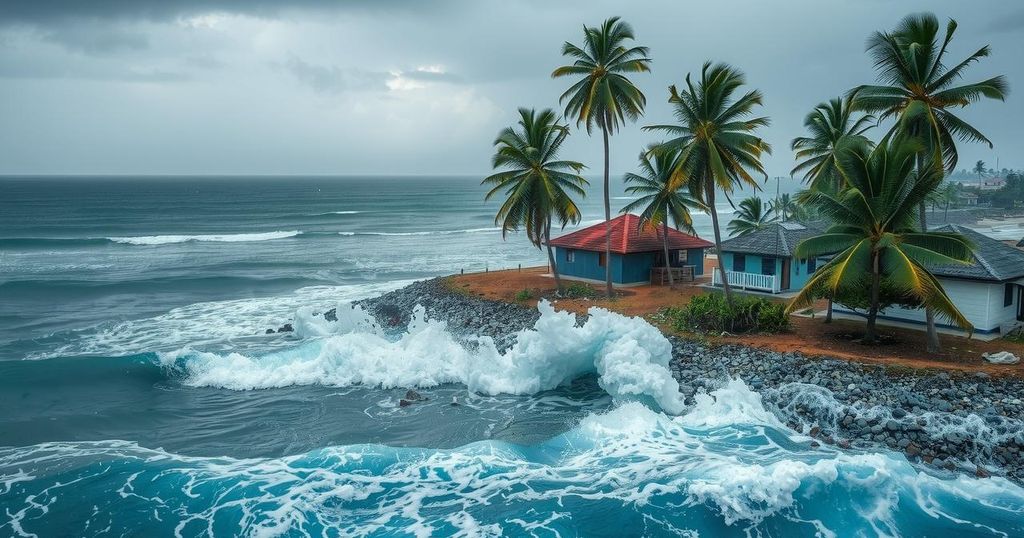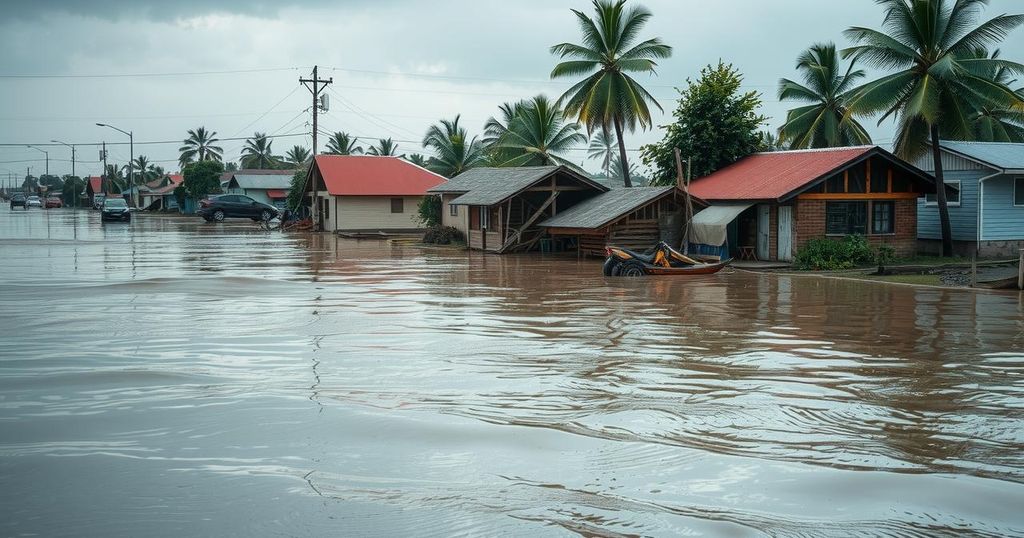Cyclone Chido Devastates Mozambique, Resulting in 94 Deaths and Widespread Damage
Cyclone Chido has resulted in 94 fatalities and significant injuries in Mozambique following its landfall. The cyclone affected over 622,000 locals and severely damaged educational and health infrastructures. Government officials are mobilizing support for impacted communities, highlighting the urgent necessity for resilient planning against the increasing threat of tropical cyclones linked to climate change.
Cyclone Chido has resulted in significant devastation in Mozambique, claiming at least 94 lives since its landfall last week. The cyclone made its impact felt on December 15, with winds reaching 260 km/h (160 mph) and recording 250 mm of rainfall within the first 24 hours. The National Institute of Risk and Disaster Management (INGD) reported that over 768 individuals suffered injuries and approximately 622,000 people were affected by the storm’s destructive forces.
The cyclone first struck the French territory of Mayotte before moving to Mozambique, Malawi, and Zimbabwe. In Mozambique, Chido predominantly impacted northern provinces, primarily Cabo Delgado, Nampula, and Niassa. The INGD noted that the education and healthcare sectors suffered severe disruptions, affecting over 109,793 students and damaging infrastructure necessary for health services for the local populace.
Daniel Chapo, a leader of Mozambique’s ruling party, acknowledged the government’s efforts to mobilize comprehensive support for the affected areas. During a visit to Cabo Delgado, Chapo confirmed ongoing collaboration with the INGD to assist the hardest-hit provinces including Mecúfi and Nampula in their recovery efforts. In Mayotte, the cyclone was identified as the most devastating storm in 90 years, with local officials predicting a significant rise in the death toll as assessments continue.
To aid in recovery, more than 1,300 officers were dispatched to support residents in Mayotte, where basic necessities remain scarce and water supply is still being restored. As part of relief efforts, the interior ministry confirmed that approximately 80 tonnes of food and 50 tonnes of water were distributed in a single day, highlighting the ongoing humanitarian response. The cyclone’s impact on social infrastructure underscores the urgent need for enhanced resilient planning to address climate change vulnerabilities and mitigate future disasters.
The complexities of tropical cyclones and their relationship to climate change reveal challenges in assessment, though studies indicate a significant human influence on the intensity and precipitation associated with such storms. This situation serves as a critical reminder of the imperative for advanced preparation and infrastructural resilience in the face of climatic threats.
The phenomenon of tropical cyclones, especially in the context of climate change, poses a notable risk to vulnerable regions across the globe. Cyclone Chido serves as a poignant illustration of the devastation such storms can wreak, particularly in countries like Mozambique with limited resources to combat natural disasters. With winds exceeding 250 km/h and significant rainfall, this cyclone exemplifies the increasing frequency and intensity of storms attributed to climate change, as suggested by the Intergovernmental Panel on Climate Change (IPCC). In the preceding weeks, Cyclone Chido made its presence known in the Indian Ocean territory of Mayotte before advancing to mainland Mozambique. The damage sustained by infrastructure, particularly in the education and health sectors, brings to light the ramifications of climate-induced events on societal well-being and development. A thorough understanding of these dynamics is essential to devise effective strategies for disaster risk reduction and infrastructure resilience.
In summary, Cyclone Chido has tragically impacted many lives in Mozambique and Mayotte, illustrating the catastrophic consequences of extreme weather events exacerbated by climate change. With a confirmed death toll of 94 in Mozambique and continued struggles for basic necessities in Mayotte, the urgent need for robust support and infrastructure resilience is evident. Continued collaboration between government agencies and community organizations will be crucial in addressing the immediate impacts and preparing for future climate-related challenges.
Original Source: www.bbc.com




Post Comment